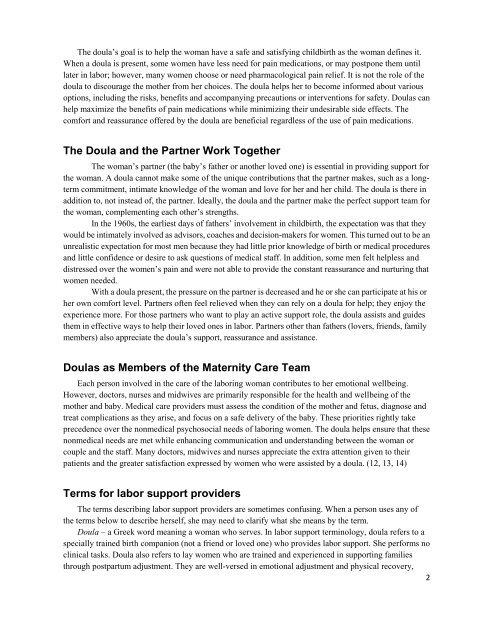Position Paper: The Birth Doula’s Contribution to Modern Maternity Care
Position Paper: The Birth Doula’s Contribution to Modern Maternity Care
Position Paper: The Birth Doula’s Contribution to Modern Maternity Care
You also want an ePaper? Increase the reach of your titles
YUMPU automatically turns print PDFs into web optimized ePapers that Google loves.
<strong>The</strong> doula’s goal is <strong>to</strong> help the woman have a safe and satisfying childbirth as the woman defines it.<br />
When a doula is present, some women have less need for pain medications, or may postpone them until<br />
later in labor; however, many women choose or need pharmacological pain relief. It is not the role of the<br />
doula <strong>to</strong> discourage the mother from her choices. <strong>The</strong> doula helps her <strong>to</strong> become informed about various<br />
options, including the risks, benefits and accompanying precautions or interventions for safety. Doulas can<br />
help maximize the benefits of pain medications while minimizing their undesirable side effects. <strong>The</strong><br />
comfort and reassurance offered by the doula are beneficial regardless of the use of pain medications.<br />
<strong>The</strong> Doula and the Partner Work Together<br />
<strong>The</strong> woman’s partner (the baby’s father or another loved one) is essential in providing support for<br />
the woman. A doula cannot make some of the unique contributions that the partner makes, such as a longterm<br />
commitment, intimate knowledge of the woman and love for her and her child. <strong>The</strong> doula is there in<br />
addition <strong>to</strong>, not instead of, the partner. Ideally, the doula and the partner make the perfect support team for<br />
the woman, complementing each other’s strengths.<br />
In the 1960s, the earliest days of fathers’ involvement in childbirth, the expectation was that they<br />
would be intimately involved as advisors, coaches and decision-makers for women. This turned out <strong>to</strong> be an<br />
unrealistic expectation for most men because they had little prior knowledge of birth or medical procedures<br />
and little confidence or desire <strong>to</strong> ask questions of medical staff. In addition, some men felt helpless and<br />
distressed over the women’s pain and were not able <strong>to</strong> provide the constant reassurance and nurturing that<br />
women needed.<br />
With a doula present, the pressure on the partner is decreased and he or she can participate at his or<br />
her own comfort level. Partners often feel relieved when they can rely on a doula for help; they enjoy the<br />
experience more. For those partners who want <strong>to</strong> play an active support role, the doula assists and guides<br />
them in effective ways <strong>to</strong> help their loved ones in labor. Partners other than fathers (lovers, friends, family<br />
members) also appreciate the doula’s support, reassurance and assistance.<br />
Doulas as Members of the <strong>Maternity</strong> <strong>Care</strong> Team<br />
Each person involved in the care of the laboring woman contributes <strong>to</strong> her emotional wellbeing.<br />
However, doc<strong>to</strong>rs, nurses and midwives are primarily responsible for the health and wellbeing of the<br />
mother and baby. Medical care providers must assess the condition of the mother and fetus, diagnose and<br />
treat complications as they arise, and focus on a safe delivery of the baby. <strong>The</strong>se priorities rightly take<br />
precedence over the nonmedical psychosocial needs of laboring women. <strong>The</strong> doula helps ensure that these<br />
nonmedical needs are met while enhancing communication and understanding between the woman or<br />
couple and the staff. Many doc<strong>to</strong>rs, midwives and nurses appreciate the extra attention given <strong>to</strong> their<br />
patients and the greater satisfaction expressed by women who were assisted by a doula. (12, 13, 14)<br />
Terms for labor support providers<br />
<strong>The</strong> terms describing labor support providers are sometimes confusing. When a person uses any of<br />
the terms below <strong>to</strong> describe herself, she may need <strong>to</strong> clarify what she means by the term.<br />
Doula – a Greek word meaning a woman who serves. In labor support terminology, doula refers <strong>to</strong> a<br />
specially trained birth companion (not a friend or loved one) who provides labor support. She performs no<br />
clinical tasks. Doula also refers <strong>to</strong> lay women who are trained and experienced in supporting families<br />
through postpartum adjustment. <strong>The</strong>y are well-versed in emotional adjustment and physical recovery,<br />
2


